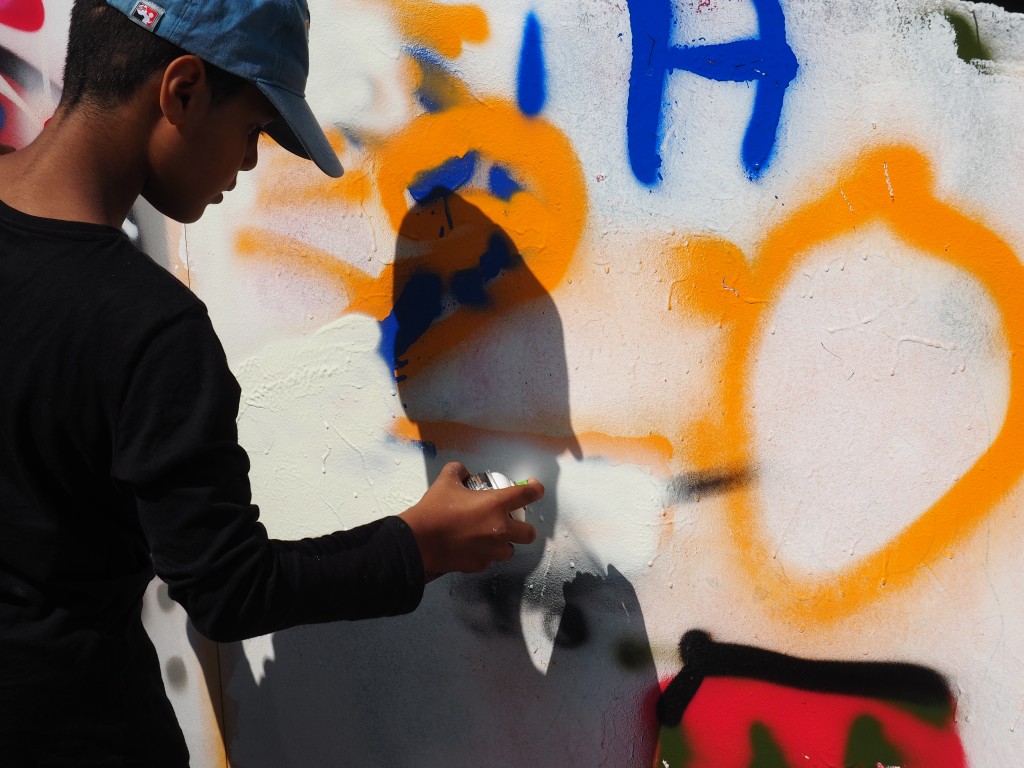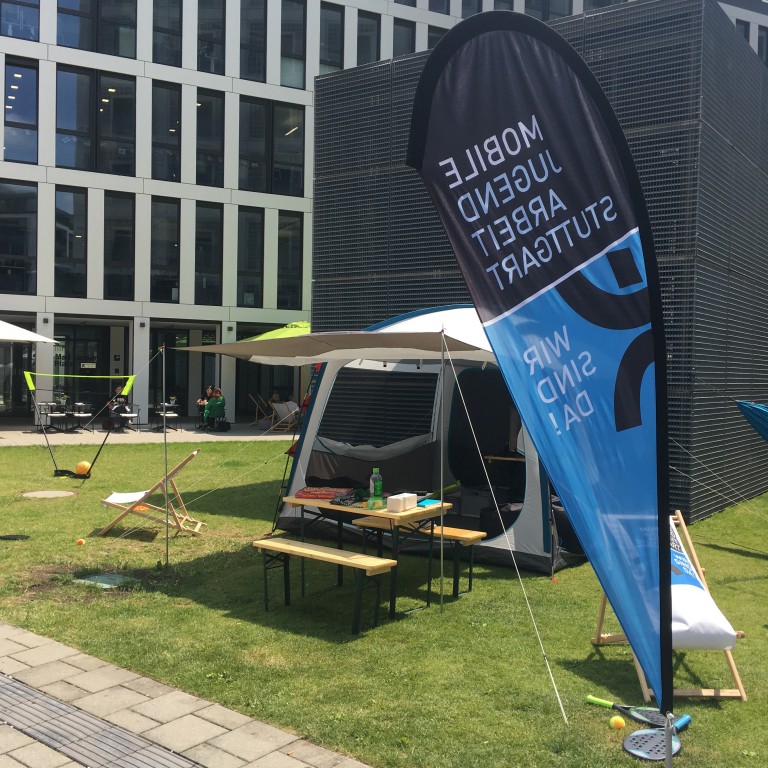Mobile Streetworker project at Stuttgart Municipal Library, Germany
A cooperation between Municipal Library and Mobile Youth Work in Stuttgart
The Municipal Library at the Mailänder Platz was the first building to be opened in 2011 in the Europaviertel, a newly built city district, which is next to Stuttgart Central Station. In the meantime, the quarter has developed a lot, and three years ago the "Milaneo" was built, a shopping centre with more than 200 shops and restaurants. With its Primark, Footlocker and Snipes shops, the Milaneo aims for a young public. The immediate neighbourhood of the Municipal Library and the shopping centre as well as its convenient connection via two tram stops make the Europaviertel and in particular the Mailänder Platz an attractive leisure location for teenagers and young adults. Only a few minutes' walk away, is one of the largest refugee shelters in Stuttgart, which accommodates many unaccompanied minors. These minors also like to visit the Mailänder Platz, the Milaneo and the Municipal Library for their leisure activities.

The Municipal Library itself is also very popular amongst young people due to its modern architecture, the pleasant atmosphere and technical possibilities. However, not all visitors are regular library users. This altered visitors’ structure brought new challenges, as the development was by no means frictionless. With the opening of the shopping centre in autumn 2015, conflicts between teenagers and library staff, security guards or other visitors increased, and there were tensions between the youth groups and cliques. House bans and an increased police presence were the consequences. At the beginning of 2016, the area around the Mailänder Platz was declared a socially troubled area in the Stuttgart Security Concept (SKS). In an article "Violence in Stuttgart: many people were seriously injured after mass brawl at the Milaneo" in the newspaper “Stuttgarter Nachrichten” by Wolf-Dieter Obst on the 10th of March 2017, the headline read: "Big alarm for the police in the city centre: Two groups clashed violently on Friday near the tram stop “Stadtbibliothek“ next to the Milaneo. Knives were also drawn – several were injured."
The Municipal Library Stuttgart did not simply want to react to these developments by increasing the pressure though harder enforcement of the houserules or imposing stricter sanctions in the event of violation of the rules. They decided to adopt a strategy towards lasting peace in this situation. However, this could not be achieved with the conflict resolution strategies usually applied in the library alone, therefore the library management contacted the Mobile Jugendarbeit Stuttgart [Mobile Youth Work] in 2016. Initial discussions focused primarily on an assessment of the local situation by the social workers. Moreover, support possibilities and new forms of offers for the youth groups were discussed. This quickly resulted in a three-month pilot project in which surveys, conducted by several dozen street workers and targeted interviews from the Institute for Applied Social Sciences (IfaS), led to a systematic analysis of the current situation. The scientific evaluation by the IfaS revealed, in addition to insights on the appropriation behaviour of young people in this public and semi-public space, that besides regular library users, three other youth groups also regularly visit the quarter: the "event-oriented tourists", the "fun-oriented residents" and the "perspective seekers". The Municipal Library decided to create low-threshold opportunities, especially for the last two groups, and to offer alternative leisure activities with new, adapted propositions in order to reduce the general conflict potential. The pilot phase also included the training of library staff on how to deal with youth groups, led by the social workers.
Once the necessary funds were available from the City of Stuttgart and the “Robert Bosch Stiftung”, Vector Stiftung, LBBW, the “Sparkasssenakademie” and other supporters, the recommendations for action derived from the analysis were put into practice. In the spring of 2018, the "Mobile Jugendarbeit im Europaviertel"-project, initially scheduled to run for two years, was launched. An interdisciplinary team consisting of 2.5 positions in social work and a full-time library position was set up to gather experience in direct daily interaction with the addressees in order to develop concepts for youth cultural leisure and educational activities that should expand and enrich the library's program work. A more holistic view of the target group due to different attitudes of the professions is a central factor for this project.
The project team is now fully staffed, with two female and one male street worker as well as a male youth librarian. The concept consists of five modules. The "Mobile Beratungsangebot” [a mobile counselling service], which includes streetwork and clique work as well as mediation to other (social) services, is carried out by the entire team. This also applies to the "Bildungs-, Kultur- und Freizeitangebote” [Education, Culture and Leisure Offers] module, which works as a bridge to the library's programme of events. "Coaching / Schulungen” [Coaching / training] and "Konfliktmanagement” [conflict management] are building blocks that are served by the social workers, including, for example, counselling library staff and advocacy support for young people. The latter element is the "Netzwerkarbeit” [network activities], which is again carried out jointly, in order to make the resources of the individual actors in the neighbourhood visible and usable.
The work began in March of this year with heavy networking: visiting committees, presenting the project, weighing up possibilities for cooperations. An interim balance of the IfaS, which, in addition to the pilot phase, also accompanies these two trial years scientifically, attested to a magnitude of three new contacts per week in the first months. The technical evaluation and evaluation of a project in this dimension is, by the way, a rarity. In addition to the expansion of a network with other institutions, the establishment of a contact network to the youth was a second priority. This was achieved through long attendance times, a lot of streetwork and the needs survey among the addressees. Thus a central contact point developed gradually outside on the library lawn in front of the east exit, which rapidly grew in size. A tent, a table tennis table, a fixed basketball hoop, a PlayStation, etc. offered low-threshold opportunities to make contact with the adolescents visiting the Europaviertel. After a few months, these activities began to become fixed common activities. During the public viewing on the library lawn at the time of the World Cup, young people, passers-by, residents and business people cheered on the various national teams.

"Creating encounters" is a goal set by the team and the project steering group themselves, in order to give the young people a positive public image. What was already successful with the public viewing also worked within the city library through small, spontaneously placed offers. On the "Music Experimentation Day", library visitors, employees and young people were able to try out various analogue and digital instruments and play music together. At about the same time, it was possible for the first time to accompany the young people addressed via streetwork to existing library events. In the "Vinyl Art" creative workshop, a 17-year-old created two art objects from the record material provided in four hours of concentrated work and received the recognition of the workshop leader and the other participants.
Now it was time to increase the intensity of the offers and to strengthen the connection to the library. An interest in music and sport frequently mentioned in the surveys was to be served by a large event format and the idea of a week of hip hop culture was born. The "edYo!cation" held during the summer holidays gave all the young people in the neighbourhood the opportunity to scratch, rap, beatbox, breakdance, develop their own texts or produce beats under professional guidance in workshops. In addition, they could decorate wooden walls outside with graffiti and play basketball. During the week there were also many positive encounters with other user groups, from the rapping banker to the basketball playing bicycle courier. On the final evening, all participants were given the opportunity to present their workshop results to an audience in the large event hall of the Municipal Library.
In the upcoming winter months, the lawn next to the library will remain an established meetup-point and will therefore be protected against the cold weather. A used caravan has already been purchased, which is currently being converted, painted and decorated with the help of youth helpers. Hopefully the identification with the central contact point of the "Mobile Jugendarbeit im Europaviertel" will continue to grow. There are already plans for 2019, e.g. a media-educational holiday project in which the young people use various techniques to create a digital, virtual of their ideal “Europaviertel”. They just recently attended media workshops on programming or used the "TikTok" app, which is regularly offered in the Municipal Library. The results of an alternative neighbourhood could therefore not only be of use to urban planners, but also enable the participants to engage in society, which in turn strengthens the community.
The first successes of such reinforcement are already emerging. At the last meeting of the steering group in autumn, representatives of the police saw their expectations of the project more than fulfilled. The statistics of all incidents recorded by the police in the area around the Mailänder Platz with the participation of young people had fallen significantly, in particular the number of violent crimes and physical injuries. Christine Bilger writes on the subject of "Security in Stuttgart" in the “Stuttgarter Zeitung” of the 24th of September 2018: "Milaneo – 'That's in the past', says Joachim Barich [head of the police department in the “Theodor-Heuss-Straße”] about the situation at the shopping centre on Mailänder Platz. Especially in the first year of the SKS operations the police were often needed there, because there had been repeated problems with youth groups. The street worker programme seems to be bringing results,' says Barich. They took care of the young people and the problems started to disappear."
Peter Marus, Junge Bibliothek, Stadtbibliothek Stuttgart, peter.marus@stuttgart.de
Translation: Robyn Stenzel